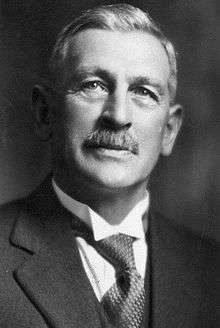James Wright Munro
| James Munro | |
|---|---|
 | |
| Member of the New Zealand Parliament for Dunedin North | |
|
In office 1922 – 1925 | |
| Preceded by | Edward Kellett |
| Succeeded by | Harold Tapley |
|
In office 1928 – 1945 | |
| Preceded by | Harold Tapley |
| Succeeded by | Robert Walls |
| Personal details | |
| Born |
22 February 1870 Dunedin, New Zealand |
| Died |
27 May 1945 (aged 75) Dunedin, New Zealand |
| Political party | Labour |
James Wright (Jim) Munro (22 February 1870 – 27 May 1945) was a New Zealand politician of the Labour Party.
Early life
Munro was born in Dunedin in 1870. He was a baker by trade, and president of the Dunedin Bakers' Union in 1907. He started his own business in partnership with Peter Neilson (who also became a Labour MP) after victimisation by employers.[1] Munro was president of the Dunedin branch of the Independent Political Labour League (IPLL) in 1907. In 1911, he was national president of the New Zealand Socialist Party.[1]
Political career
| Parliament of New Zealand | ||||
| Years | Term | Electorate | Party | |
| 1922 | 20th | Dunedin North | Labour | |
| 1922–1925 | 21st | Dunedin North | Labour | |
| 1928–1931 | 23rd | Dunedin North | Labour | |
| 1931–1935 | 24th | Dunedin North | Labour | |
| 1935–1938 | 25th | Dunedin North | Labour | |
| 1938–1943 | 26th | Dunedin North | Labour | |
| 1943–1945 | 27th | Dunedin North | Labour | |
He first stood for Parliament when he contested the Dunedin West electorate in the 1908 election for the IPLL.[2] On this occasion, he was beaten by John A. Millar of the Liberal Party.[3] He contested the same electorate in the 1911 election for the Socialist Party as one of three candidates and was eliminated in the first ballot.[4][5]
He unsuccessfully contested the 1914 election in the Dunedin Central electorate for the United Labour Party against Charles Statham of the Reform Party. Statham resigned after the election after irregularities in the counting of the vote turned a 12-vote lead for Munro into a 12-vote loss.[1][6] Munro and Statham contested the resulting 1915 by-election, which was narrowly won by Statham.[7]
Munro and Statham contested the Dunedin Central electorate again in the 1919 election, Munro standing for the Labour Party, and Statham as an Independent.[1] The incumbent was successful.[8]
Munro represented the electorate of Dunedin North in Parliament from the 1922 by-election to 1925, and from 1928 to 1945, when he died.[9]
In 1935, he was awarded the King George V Silver Jubilee Medal.[10]
He was not appointed a minister in 1935 as he had a reputation for being lazy, and had embarrassed Savage a week before the 1935 election by stating that:
- "if anyone tried to stop a Labour government carrying out its policy, Labour might have to ‘smash things’ and put directors and managers in gaol on a bread and water diet ‘as some of our Communist friends were dealt with’ until they learnt to obey the government".[11]
He was on the Dunedin City Council (1927–1945) and Dunedin Harbour Board.[1] He died in Dunedin on 27 May 1945,[9][12] and his ashes were buried at Andersons Bay Cemetery.[13]
Notes
- 1 2 3 4 5 Gustafson 1980, p. 163.
- ↑ "Dunedin West". Taranaki Herald. LIV (13785). 17 October 1908. p. 5. Retrieved 15 November 2013.
- ↑ "The General Election, 1908". National Library. 1909. p. 22. Retrieved 14 April 2012.
- ↑ "Dunedin West Seat". Hawera & Normanby Star. LXII. 21 November 1911. p. 5. Retrieved 16 November 2013.
- ↑ "The General Election, 1911". National Library. 1912. p. 8. Retrieved 1 August 2013.
- ↑ "The General Election, 1914". National Library. 1915. p. 25. Retrieved 1 August 2013.
- ↑ Wilson 1985, p. 236.
- ↑ The New Zealand Official Year-Book. Government Printer. 1920. Retrieved 2 August 2013.
- 1 2 Wilson 1985, p. 222.
- ↑ "Official jubilee medals". The Evening Post. CXIX (105). 6 May 1935. p. 4. Retrieved 8 March 2014.
- ↑ Gustafson 1986, p. 177.
- ↑ "Obituary: Mr. J. W. Munro, M.P.". Evening Post. 28 May 1945. p. 6. Retrieved 26 November 2015.
- ↑ "Cemeteries search". Dunedin City Council. Retrieved 26 November 2015.
References
- Gustafson, Barry (1980). Labour's path to political independence: The Origins and Establishment of the New Zealand Labour Party, 1900–19. Auckland, New Zealand: Auckland University Press. ISBN 0-19-647986-X.
- Gustafson, Barry (1986). From the Cradle to the Grave: a biography of Michael Joseph Savage. Auckland: Reed Methuen. ISBN 0-474-00138-5.
- Wilson, James Oakley (1985) [First published in 1913]. New Zealand Parliamentary Record, 1840–1984 (4th ed.). Wellington: V.R. Ward, Govt. Printer. OCLC 154283103.
| New Zealand Parliament | ||
|---|---|---|
| Preceded by Edward Kellett |
Member of Parliament for Dunedin North 1922 – 1925 1928 – 1945 |
Succeeded by Harold Tapley |
| Preceded by Harold Tapley |
Succeeded by Robert Walls | |